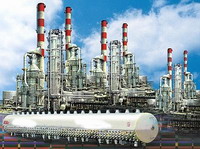Royal Dutch Shell PLC to nearly double size of oil refinery
Royal Dutch Shell PLC will expand an oil refinery it operates with a Saudi partner in Port Arthur on the Texas Gulf Coast.

Shell, one of the world's largest oil companies, said Friday its decision to expand the refinery will increase U.S. supplies of gasoline, diesel and jet fuel.
Shell plans to boost the Port Arthur refinery's capacity to 600,000 barrels of crude oil per day by 2010 from the current 275,000 barrels per day.
Shell estimated that the expansion, the biggest in more than 30 years, would cost about $7 billion (4.98 billion EUR).
The Anglo-Dutch company operates the refinery with Saudi Refining Inc., a subsidiary of Saudi national oil company Saudi Aramco, in a venture called Motiva Enterprises LLC.
Major oil companies have canceled plans to build new refineries or greatly expand current ones for many years because of environmental opposition and because the profit margins on refining crude oil were too thin.
The Shell-Saudi expansion will occur at an existing plant, however, making it easier to obtain the necessary permits. Workers have already begun sinking pilings into the soil where major units will be built.
And refining margins have rebounded since 2002. Shell is betting that they will remain strong along with high prices for crude oil, analysts said.
"If they didn't think the future is going to be better than the past, it makes no sense," said Fadel Gheit, an oil industry analyst with Oppenheimer & Co. "The outlook must have improved. This is meaningful and needed."
Gheit said, however, that Shell's move is unlikely to push other oil companies to greatly expand their U.S. refineries. He said steady but small increases - "capacity creep," as oil executives call it - and more use of ethanol could satisfy U.S. gasoline demand, especially if fuel-mileage standards are toughened.
A government advisory panel led by retired Exxon Mobil Corp. Chief Executive Lee Raymond reported recently that while global demand for oil could grow sharply, U.S. oil consumption could fall by 3 million to 5 million barrels a day if vehicle fuel-efficiency standards are doubled by 2030.
The companies, however, expect demand for gasoline to continue growing - even with oil surging past $80 per barrel.
"Demand for the product is growing in the U.S., and actually demand exceeds the current refining capacity by quite a bit, up to the point where we have to import about a million barrels a day," said Rob Routs, Royal Dutch Shell's executive director of refining.
The Shell-Saudi Refining venture has been considering a major expansion at Port Arthur for some time, and it grew more serious within the past year.
Shell had not previously publicly put a cost estimate on the project, although there were widely reported estimates from local officials that the project would run about $4 billion (2.85 billion EUR).
Routs acknowledged that labor and material costs along the Gulf had increased but said the project remained very attractive.
Shell estimated the project will create 4,500 construction jobs and 300 production jobs. It has substantial local support. "We're feeling wanted," Routs said.
At 600,000 barrels per day capacity, the Shell-Saudi Refining project would be larger than Exxon Mobil's nearby Baytown plant, which is now the largest U.S. refinery at 562,500 barrels per day.
The Motiva facility traces its roots to refineries built to handle oil from the Spindletop boom in the early 1900s. The plant went through major expansions in the 1970s and '80s. Saudi Refining bought a half-interest in 1989, and Shell became an equal owner in 2002.
The plant was knocked out of production by Hurricane Katrina in 2005, and was shut down again this month when Hurricane Humberto cut off power to the plant. It has only slowly begun to recover. Shell officials said Friday the refinery has resumed partial production, which will be increased over the next few days.
The last new refinery in the United States was Marathon Oil Corp.'s plant in Garyville, Louisiana, which opened in 1976. Houston-based Marathon recently announced a $3.2 billion (2.28 billion EUR) project to raise capacity to 425,000 barrels per day, an increase of 180,000 barrels per day.
Still, many other projects have been scrapped or delayed, including expansions planned by Valero Energy Corp., ConocoPhillips and Tesoro Corp.
The American Petroleum Institute said in May that refiners planned to increase U.S. capacity by nearly 11 percent, but the trade group has since cut that forecast by more than one-third.
Subscribe to Pravda.Ru Telegram channel, Facebook, RSS!





